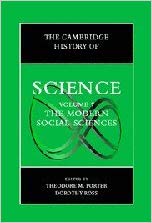 Editors: Theodore M. Porter and Dorothy Ross
Editors: Theodore M. Porter and Dorothy Ross
Publisher: Cambridge University Press – 762 pages
Book Review by: Sonu Chandiram
Social science, in its broadest sense, is the study of society and the manner in which people behave, influence, and interact among one another.
The disciplines that can be called ‘social sciences’ are numerous, so depending upon which website you go, you will find groups of different social sciences that have some common threads.
For example, the Economic and Social Research Council (ESRC) of the United Kingdom notes these groups of disciplines within the social sciences:
- Demographics and social sciences, methods and computing
- Developmental studies, human geography, and environmental planning
- Economics, management and business studies
- Education, social anthropology and linguistics
- Law, economic and social history
- Politics and international relations
- Psychology and sociology
- Science and technology studies
- Social policy and social work.
This book however, the Cambridge History of Science, Volume 7 – The Modern Social Sciences, lists a somewhat similar but also somewhat different list of the social sciences whose histories it traces, with the major developments and events that shaped and transformed them.
Forty specialists in the various social sciences from the United States and 12 other countries around the world – Argentina, Austria, Canada, the Czech Republic, France, Germany, Italy, the Netherlands, Russia, Scotland, South Africa, and the United Kingdom – authored the 43 chapters of this book.
We list the chapter titles below to provide you an overview of the extensive and varied content you will find in this volume:
- Introduction: Writing the History of Social Science
- Part I – Sciences of the Social to the Late Nineteenth Century
- Genres and Objects of Social Inquiry, from the Enlightenment to 1890
- Social Thought and Natural science
- Cause, Teleology, and Method
- Utopian Socialism and Social Science
- Social Surveys in the Eighteenth and Nineteenth Centuries
- Scientific Ethnography and Travel, 1750 – 1850
- History and Historicism
- Bringing the Psyche into Scientific Focus
- Continental Political Economy from the Physiocrats to the Marginal Revolution
- British Economic Theory from Locke to Marshall
- Marx and Marxism
- Part II – Disciplines in Western Europe and North America Since About 1880
- Changing Contours of the Social Science Disciplines
- Statistics and Statistical Methods
- Psychology
- Economics
- Political Science
- Sociology
- Anthropology
- Geography
- History and the Social Sciences
- The Internationalization of the Social Sciences
- The Sciences of Modernity in a Disparate World
- Social Sciences in Latin America during the Twentieth Century
- Psychology in Russia and Central and Eastern Europe
- Sociology in Egypt and Morocco
- The Social Sciences in Africa
- The Social Sciences in India
- The Social Sciences in China
- The Social Sciences in Japan
- Part IV – Social Sciences As Discourse and Practice in Public and Private Life
- The Uses of the Social Sciences
- Managing the Economy
- Management and Accounting
- Polling in Politics and Industry
- Social Science and Social Planning during the Twentieth Century
- Social Welfare
- Education
- The Culture of Intelligence
- Psychologism and the Child
- Psychiatry
- Gender
- Race and the Social Sciences
- Cultural Relativism
- Modernization
This volume is a broad cultural history of social science that analyzes the participation of social disciplines in the making of the modern world. In a nutshell, this work provides a history of the social sciences since the year 1800 in terms of the following:
- Concepts
- Ideologies
- Institutions
- Practices
The authors of its 43 chapters offer original, synthesized accounts of:
- The historic development of social knowledge, including its
- Philosophical assumptions
- Social and intellectual organization
- Relations to bureaucracy, medicine, politics, professions, religion, science
- Inquiries into
- Careers of the main social disciplines (anthropology, economics, geography, history, political science, psychology, and statistics)
- Genres and traditions that formed social science
- International essays on social science in Africa, Asia, Eastern Europe, and Latin America
- Involvement of social sciences in business, culture, education, government, social policy
This is an excellent, extensive history of the various social sciences and their important role as a whole, in shaping the world we live in today. The editors and authors are to be commended for this outstanding contribution to our knowledge and enlightenment.
Editors:
Theodore M. Porter is Professor of the History of Science in the Department of History at the University of California in Los Angeles. He is the author of The Rise of Statistical Thinking, 1820-1900 (1936) and Trust in Numbers: The Pursuit of Objectivity in Science and Public Life (1995) and coauthor of The Empire of Chance: How Probability Changed Science and Everyday Life (1989).
Dorothy Ross is the Arthur O. Lovejoy Professor of History at Johns Hopkins University. She is the author of G. Stanley Hall: The Psychologist as Prophet (1972) and The Origins of American Social Science (1991) and editor of Modernist Impulses in the Human Sciences, 1870-1930 (1994).





